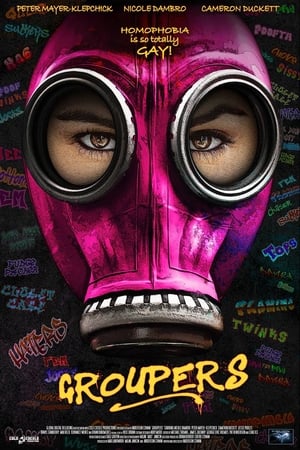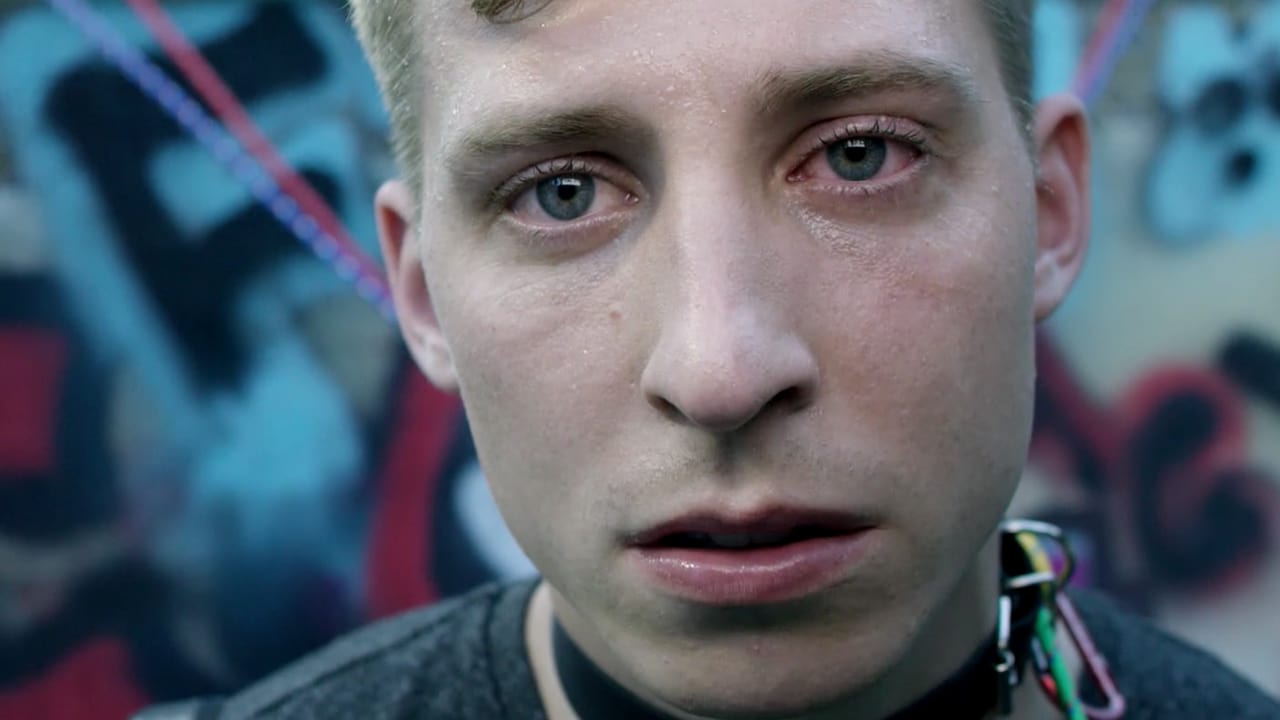
Who bullies the bully?
It is well to begin by being fair, and acknowledging that Groupers is a very small movie with a very, very small budget. And this is not something that you'd necessarily be able to guess just by looking at it, or listening to it. First-time writer-director-producer Anderson Cowan has soared past the biggest challenge facing the indie filmmaker: he has crafted a story around the limitations he can overcome, and has done so in a way that doesn't look like he's being limited. He's set more or less the entire feature - and at 109 minutes, it's by no means a short feature - in basically just one location, but it doesn't feel like a stageplay crudely stranded in cinematic clothes, nor does it get visually boring. It doesn't suffer from the most annoying tendency of micro-budget filmmaking, inadequate sound recording, and that despite mostly taking place outdoors.
These are all admirable achievements, which makes it a little startling and disappointing that the one massive failure of the film is the one major part of the filmmaking process that isn't beholden to financial constraints: its screenplay. Cowan's story is a flashy provocation that keeps sweeping in big social issues without having any real sense of the implications of any of them; or rather, it doesn't seem interested in those implications, instead just using them as pretexts for amping up the conflicts within an ever-increase population of characters. And that increase is itself handled in a fairly messy way, delighting in ostensibly comic anarchy for the sake of it, feeling more like a juggler showing off how many objects he can work with, rather than a storyteller allowing complications to unfold organically.
Initially, it's a small enough object: high school bros Brad (Peter Mayer-Klepchick) and Dylan (Cameron Duckett), having successfully made it to a bar with the laziest bouncer in the world, and promptly get abducted by Meg (Nicole Dambro), the older woman they attempted to hit on. When they wake up from the drug she's doped them up with, they're tied together in an elaborate system of cables in an abandoned swimming pool behind a vacant McMansion. The most elaborate part of the rig is the Chinese finger trap that she's used to connect their penises, and thereon hangs the plot: Meg, it turns out, is a grad student with an especially demented plan for an experiment. Brad and Dylan, it turns out, are a pair of homophobic bullies, who've tormented her younger brother Orin (Jesse Pudles) into a suicide attempt. So she's getting to enact revenge in the form of a teachable moment: she's hoping to have the two boys demonstrate conclusively that (as they maintain), same-sex attraction is a "choice", proposing that if they can both sprout erections while looking into each other's eyes, they'll be able to escape the trap.
This already raises at least one question that I don't think the film ever considered: if you put a flaccid penis into a Chinese finger trap, the trick to getting it back out almost certainly doesn't involve engorging it with blood. But it's a fairy tale, and the mechanics of children's novelty toys is by no means the biggest point where the film hasn't really tried to think through its scenario. There is, for example, every other aspect of that plot synopsis. And even that isn't taking into account the pile-up of complications that start to ensue once the film begins expanding its ensemble past those three - it has quite a few characters who are going to end up in that pool, and the very first one reveals a truth about the whole scenario that pushes Meg from righteous avenger to actual psychopath, though the film always prefers to position her as the one stable, moral figure in the whirlwind of grotesques that end up coming along for the ride.
The trick of it is that Groupers doesn't actually intend to be about homophobic bullying, or bullying at all; its goal in mashing together so many different weird figures is to make note of how people form in-groups and out-groups according to this or that largely arbitrary criteria, and then defend those in-groups with ravenous passion and bigotry. Its other goal is to do so more with a sarcastic sense of humor than a lecturing tone, and for that I am at least grateful. But this does mean that the film stays at surface level for the most part, portraying its characters as types, and not even very interesting types. Meg, Brad, and Dylan will remain the most nuanced characters in the film (it helps a lot that Dambro gives a genuinely strong, engaging performance, and Mayer-Klepchick isn't too far behind her), and every new member of the cast is pretty much pure caricature, particularly the whiny white trash duo of Frank (Max Read III) and Hank (Travis Stanberry).
Besides which, humor as a complicating element to the kind of morality play Groupers presents only works if the humor is good, and here's the point where I drop in the usual caveat that funny is subjective. But boy, did I not find any of this funny. It's more snide than anything, everybody spitting acidic quips and barbed vulgarity, and everybody in the cast speaks more or less the same way; they have no individual personalities, only the bundle of clichés that describe them in the first moment we see them. And it frankly gets awfully tiring, a long time before the film has used up its running time. It's not without wit; Meg's last scene, in particular, is a slightly delectable send-up of academia that's smarter than anything else the movie has offered to that point. But mostly, this is a lot of brash, crass attitude, good at pushing buttons but not very interesting beyond that. Attitude appeals to some people more than others, and there's no denying that it's impressive that this feels so much like a proper movie on threadbare resources; I don't know that I'd have had the heart to be mean to it if it didn't so resoundingly outperform its pocket-change budget, to feel like a full-on theatrical release. But that also means it doesn't get the micro-budget film's "free pass just for existing" bonus.
These are all admirable achievements, which makes it a little startling and disappointing that the one massive failure of the film is the one major part of the filmmaking process that isn't beholden to financial constraints: its screenplay. Cowan's story is a flashy provocation that keeps sweeping in big social issues without having any real sense of the implications of any of them; or rather, it doesn't seem interested in those implications, instead just using them as pretexts for amping up the conflicts within an ever-increase population of characters. And that increase is itself handled in a fairly messy way, delighting in ostensibly comic anarchy for the sake of it, feeling more like a juggler showing off how many objects he can work with, rather than a storyteller allowing complications to unfold organically.
Initially, it's a small enough object: high school bros Brad (Peter Mayer-Klepchick) and Dylan (Cameron Duckett), having successfully made it to a bar with the laziest bouncer in the world, and promptly get abducted by Meg (Nicole Dambro), the older woman they attempted to hit on. When they wake up from the drug she's doped them up with, they're tied together in an elaborate system of cables in an abandoned swimming pool behind a vacant McMansion. The most elaborate part of the rig is the Chinese finger trap that she's used to connect their penises, and thereon hangs the plot: Meg, it turns out, is a grad student with an especially demented plan for an experiment. Brad and Dylan, it turns out, are a pair of homophobic bullies, who've tormented her younger brother Orin (Jesse Pudles) into a suicide attempt. So she's getting to enact revenge in the form of a teachable moment: she's hoping to have the two boys demonstrate conclusively that (as they maintain), same-sex attraction is a "choice", proposing that if they can both sprout erections while looking into each other's eyes, they'll be able to escape the trap.
This already raises at least one question that I don't think the film ever considered: if you put a flaccid penis into a Chinese finger trap, the trick to getting it back out almost certainly doesn't involve engorging it with blood. But it's a fairy tale, and the mechanics of children's novelty toys is by no means the biggest point where the film hasn't really tried to think through its scenario. There is, for example, every other aspect of that plot synopsis. And even that isn't taking into account the pile-up of complications that start to ensue once the film begins expanding its ensemble past those three - it has quite a few characters who are going to end up in that pool, and the very first one reveals a truth about the whole scenario that pushes Meg from righteous avenger to actual psychopath, though the film always prefers to position her as the one stable, moral figure in the whirlwind of grotesques that end up coming along for the ride.
The trick of it is that Groupers doesn't actually intend to be about homophobic bullying, or bullying at all; its goal in mashing together so many different weird figures is to make note of how people form in-groups and out-groups according to this or that largely arbitrary criteria, and then defend those in-groups with ravenous passion and bigotry. Its other goal is to do so more with a sarcastic sense of humor than a lecturing tone, and for that I am at least grateful. But this does mean that the film stays at surface level for the most part, portraying its characters as types, and not even very interesting types. Meg, Brad, and Dylan will remain the most nuanced characters in the film (it helps a lot that Dambro gives a genuinely strong, engaging performance, and Mayer-Klepchick isn't too far behind her), and every new member of the cast is pretty much pure caricature, particularly the whiny white trash duo of Frank (Max Read III) and Hank (Travis Stanberry).
Besides which, humor as a complicating element to the kind of morality play Groupers presents only works if the humor is good, and here's the point where I drop in the usual caveat that funny is subjective. But boy, did I not find any of this funny. It's more snide than anything, everybody spitting acidic quips and barbed vulgarity, and everybody in the cast speaks more or less the same way; they have no individual personalities, only the bundle of clichés that describe them in the first moment we see them. And it frankly gets awfully tiring, a long time before the film has used up its running time. It's not without wit; Meg's last scene, in particular, is a slightly delectable send-up of academia that's smarter than anything else the movie has offered to that point. But mostly, this is a lot of brash, crass attitude, good at pushing buttons but not very interesting beyond that. Attitude appeals to some people more than others, and there's no denying that it's impressive that this feels so much like a proper movie on threadbare resources; I don't know that I'd have had the heart to be mean to it if it didn't so resoundingly outperform its pocket-change budget, to feel like a full-on theatrical release. But that also means it doesn't get the micro-budget film's "free pass just for existing" bonus.
Categories: comedies, indies and pseudo-indies, unfunny comedies






